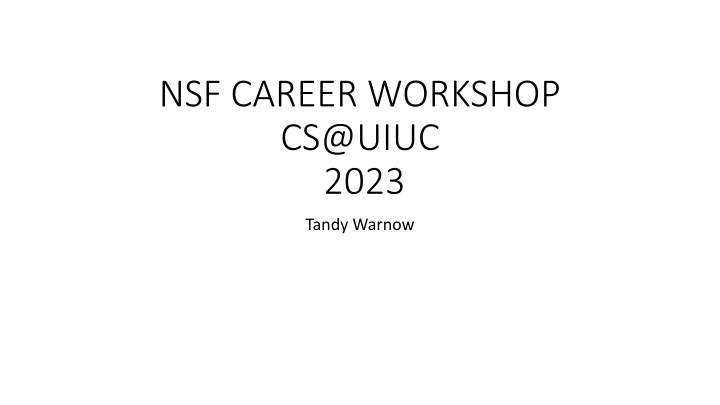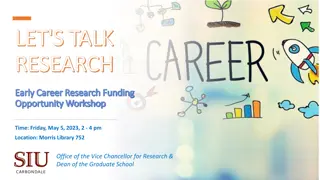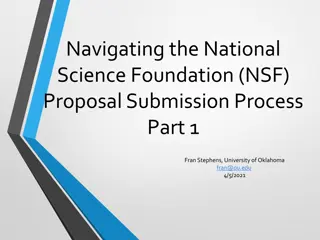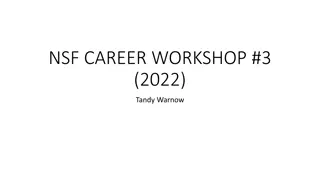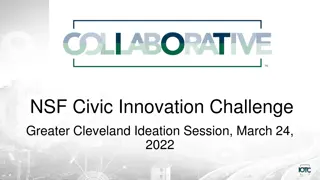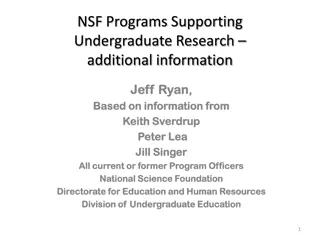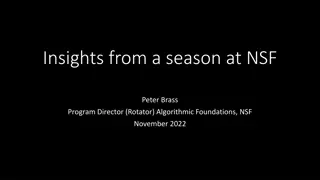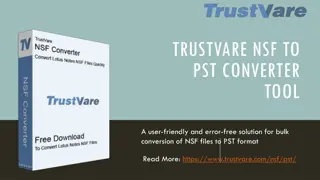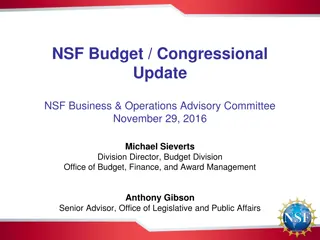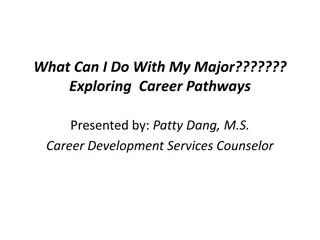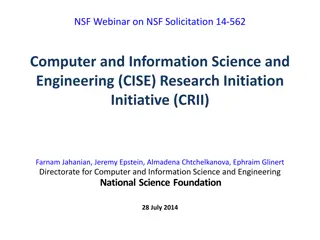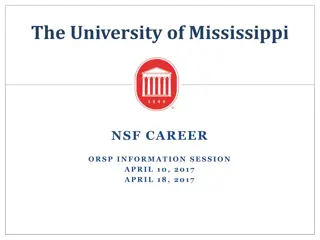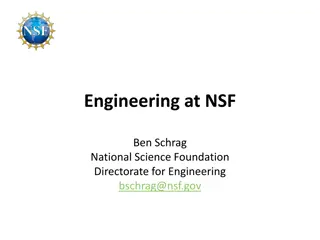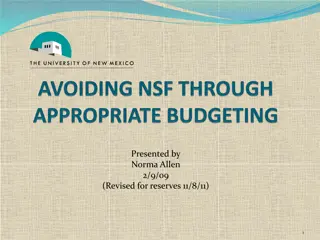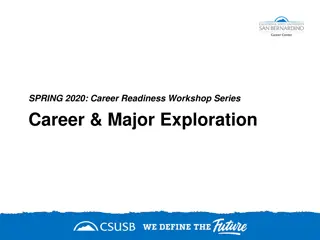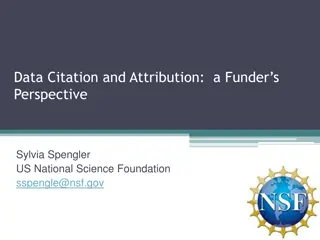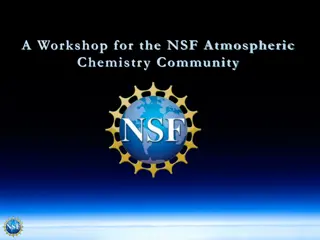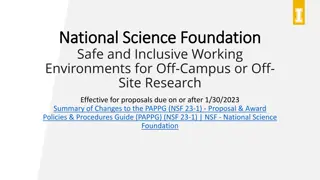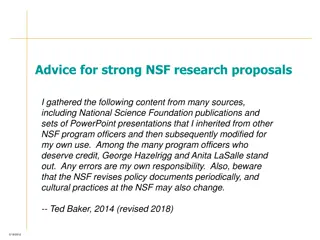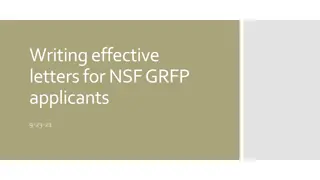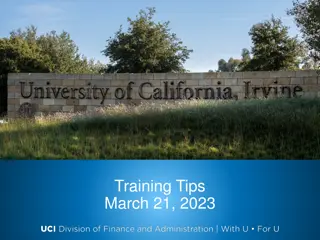NSF Career Workshop 2023: Tips and Deadlines
Overview of NSF CAREER proposal process, including eligibility criteria, important messages, and submission deadlines. Tips from experts on letters, budget, and document preparation. Emphasis on starting early, careful planning, and revision process. Highlighted deadlines and recommendations for successful submission.
Download Presentation

Please find below an Image/Link to download the presentation.
The content on the website is provided AS IS for your information and personal use only. It may not be sold, licensed, or shared on other websites without obtaining consent from the author.If you encounter any issues during the download, it is possible that the publisher has removed the file from their server.
You are allowed to download the files provided on this website for personal or commercial use, subject to the condition that they are used lawfully. All files are the property of their respective owners.
The content on the website is provided AS IS for your information and personal use only. It may not be sold, licensed, or shared on other websites without obtaining consent from the author.
E N D
Presentation Transcript
NSF CAREER WORKSHOP CS@UIUC 2023 Tandy Warnow
Today Tandy Warnow: Brief overview of the CAREER proposal process and requirements Hannah Gorrie: Advice regarding Nancy s letter Jonathon Manuel: Advice regarding deadline, budget, documents, etc. Advice from faculty who have received CAREER awards and/or been on NSF panels for CAREER awards Recommendations Q&A
Eligibility Assistant professor ( tenure track equivalent ) and must be engaged in both (NSF-fundable) research and education Must have doctorate in relevant field Do not need to be tenure-track (but must be at least 50% time) Can have prior NSF funding, but not CAREER award Limited to three tries (at most one each year)
MOST IMPORTANT TAKE HOME MESSAGES Read the solicitation carefully (NSF 22-586) See NSF webpage (which has links to slides and recordings) https://new.nsf.gov/funding/opportunities/faculty-early-career-development-program-career See also https://www.nsf.gov/pubs/2022/nsf22586/nsf22586.htm Make sure to get your proposal started early in Research.gov, and get your documents done (new format, possibly using ScienCV). Get the budget done as early as possible work well with your grants person. Note the early SPA deadline, and hence CS deadline (next slide) Pick the NSF division carefully (CCF, IIS, etc) Get drafts done early, get lots of feedback from insiders and from people further afield Revise, revise, revise And don t be surprised if you are declined the first time. Note the limitations on number of times you can apply.
Deadlines NSF deadline: Wednesday July 26 SPA deadline: Thursday July 20 (4 business days earlier) CS grants office deadline: Tuesday July 18 If you miss the NSF deadline, the proposal is toast. If you miss the SPA deadline, they won t check for errors. If you miss the CS deadline, it may not reach SPA on time Note: SPA will not review the proposal until it is complete.
NSF recommends very early submission Recommended timeline posted by NSF strongly suggests submitting a week ahead *to NSF* (not just to SPA) https://www.research.gov/common/attachment/Common/Career_deadline.pdf
Low-level points for CAREER proposal Deadline at NSF: July 26, 2023 (earlier deadline at SPA) No Co-PIs You can only apply a total of three times (and not more than once per year) 5-year funding, total budget at least $400K (that includes indirect) Eligibility: tenure-track equivalent , must be involved in research, Assistant Professor (or equivalent), untenured. (Note: PECASE eligibility also requires US citizen, national, or permanent resident.) Submitted through Research.gov Requires letter from Nancy Amato Use of ScienCV for documents not yet required, but will be required soon
High-level points about CAREER proposals Not just any proposal: should be long term, ambitious, and high impact. Emphasis on innovation in teaching/education Emphasis on integration of research and education Your proposal may be read by people far outside your field: make it easy to understand and the clear potential for high impact Pay attention to broader impacts , including broadening participation Make sure to include evaluation of research, education, and broader impacts activities
Project Description The Project Description section should contain a well-argued and specific proposal for activities that will, over a 5-year period, build a firm foundation for a lifetime of contributions to research and education in the context of the Principal Investigator's organization. The proposed project should aim to advance the employee's career goals and job responsibilities as well as the mission of the department or organization. The Project Description may not exceed 15 pages. The Project Description should include: a description of the proposed research project, including preliminary supporting data where appropriate, specific objectives, methods and procedures to be used, and expected significance of the results; a description of the proposed educational activities and their intended impact; a description of how the research and educational activities are integrated or synergistic; a description of other broader impacts, besides the education activities, that will accrue from the project; and results of prior NSF support, if applicable.
Integrating research and education Successful applicants will propose creative, effective research and education plans, along with strategies for assessing these components. The proposed activities should help applicants develop in their careers as both outstanding researchers and educators. While excellence in both education and research is expected, activity of an intensity that leads to an unreasonable workload is not. The research and educational activities do not need to be addressed separately if the relationship between the two is such that the presentation of the integrated project is better served by interspersing the two throughout the Project Description.
Education component The education component of the proposal may be in a broad range of areas and may be directed to any level: K-12 students, undergraduates, graduate students, and/or the general public, but should be related to the proposed research and consistent with the career goals of the PI. Some examples are: incorporating research activities into undergraduate courses; teaching a graduate seminar on the topic of the research; designing innovative courses or curricula; providing mentored international research experiences for U.S. students; linking education activities to industrial, international, or cross-disciplinary work; supporting teacher preparation and enhancement; conducting outreach and mentoring activities to enhance scientific literacy or involve students from groups that have been traditionally underrepresented in science; researching students' learning and conceptual development in the discipline; implementing innovative methods for evaluation and assessment; or creating cyberinfrastructure that facilitates involvement of the broad citizenry in the scientific enterprise. Education activities may also include designing new or adapting and implementing effective educational materials and practices.
International/Global Dimensions NSF encourages CAREER Principal Investigators to include international/global dimensions in their projects. As appropriate, the CAREER proposal should delineate how its activities fit within the context of expertise, facilities, data, and other resources that are being applied globally in relevant areas of research and education, and how the CAREER award would position the Principal Investigator and his/her organization to take a leadership role. If applicable, the proposal should clearly state how the research and education activities will be enhanced by international engagements, and should describe the benefits to participants in the U.S. and abroad. If an international component is included, proposers are encouraged to contact the relevant country Program Officer in the Office of International Science and Engineering (OISE) listed in https://www.nsf.gov/od/iia/ise/country-list.jsp.
Departmental letter of support The Departmental Letter should be no more than 2 pages in length and include the department head's name and title below the signature. The letter should contain the following elements: A statement to the effect that the PI is eligible for the CAREER program. An indication that the PI's proposed CAREER research and education activities are supported by and advance the educational and research goals of the department and the organization, and that the department is committed to the support and professional development of the PI; and A description of a) the relationship between the CAREER project, the PI's career goals and job responsibilities, and the mission of his/her department/organization, and b) the ways in which the department head (or equivalent) will ensure the appropriate mentoring of the PI, in the context of the PI's career development and his/her efforts to integrate research and education throughout the period of the award and beyond. Note that the Department Letter should not be construed as a Letter of Support for the PI and should address only the items listed above.
Letters of collaboration If the project involves collaborative arrangements of significance, these arrangements should be documented through letters of collaboration. Letters of collaboration should be limited to stating the intent to collaborate and should not contain endorsements or evaluation of the proposed project.
PECASE PECASE eligibility: you must be US citizen, US national. or permanent resident at the time you are eligible for PECASE. If you are eligible, you should upload a statement stating, I wish to be considered for the PECASE honorary award. If you do not meet the eligibility requirements at the time of submission but do meet the requirements post proposal submission and wish to be considered for PECASE, you may submit an interim report on your CAREER award to the cognizant program officer that states: I meet the eligibility requirements for PECASE and wish to be considered for the honorary award.
Budget The CAREER award, including indirect costs, is expected to total a minimum of $400,000 for the 5-year duration. Awards for proposals to the Directorate for Computer and Information Science and Engineering are expected to support one month of PI salary per year, one graduate student per year, and two trips per year; this may vary depending on individual circumstances, e.g., if the PI already has salary support. Before preparing a CAREER proposal, PIs are strongly encouraged to contact their disciplinary Program Officer or the appropriate CAREER contact to discuss budget requests for their proposed CAREER activities, and typical funding levels for their discipline. Many programs and Directorates prefer to make more awards by funding CAREER proposals closer to the minimum award size. Proposers should also review the list of recent CAREER awards made in their discipline for guidance on average award size. A list of CAREER Division/Directorate Contacts can be found on the CAREER web page at https://www.nsf.gov/crssprgm/career/contacts.jsp
Return without Review Submitted after deadline The proposed work duplicates, or is substantially similar to, a proposal already under consideration by NSF from the same submitter The proposal was previously declined and was not revised to take into account the major comments from the prior NSF review The proposal topic falls outside the purview of NSF
Project Description The Project Description should include: a description of the proposed research project, including preliminary supporting data where appropriate, specific objectives, methods and procedures to be used, and expected significance of the results; a description of the proposed educational activities and their intended impact; a description of how the research and educational activities are integrated or synergistic; a description of other broader impacts, besides the education activities, that will accrue from the project; and results of prior NSF support, if applicable.
Evaluation of proposals Intellectual Merit: The Intellectual Merit criterion encompasses the potential to advance knowledge; and Broader Impacts: The Broader Impacts criterion encompasses the potential to benefit society and contribute to the achievement of specific, desired societal outcomes. The following elements should be considered in the review for both criteria. What is the potential for the proposed activity to Advance knowledge and understanding within its own field or across different fields (Intellectual Merit); and Benefit society or advance desired societal outcomes (Broader Impacts)? To what extent do the proposed activities suggest and explore creative, original, or potentially transformative concepts? Is the plan for carrying out the proposed activities well-reasoned, well-organized, and based on a sound rationale? Does the plan incorporate a mechanism to assess success? How well qualified is the individual, team, or organization to conduct the proposed activities? Are there adequate resources available to the PI (either at the home organization or through collaborations) to carry out the proposed activities?
Broader Impacts (and BPC) The Broader Impacts criterion encompasses the potential to benefit society and contribute to the achievement of specific, desired societal outcomes. Broader impacts may be accomplished through the research itself, through the activities that are directly related to specific research projects, or through activities that are supported by, but are complementary to, the project. Societal outcomes include, but are not limited to: full participation of women, persons with disabilities, and other underrepresented groups in science, technology, engineering, and mathematics (STEM); improved STEM education and educator development at any level; increased public scientific literacy and public engagement with science and technology; improved well-being of individuals in society; development of a diverse, globally competitive STEM workforce; increased partnerships between academia, industry, and others; improved national security; increased economic competitiveness of the United States; and enhanced infrastructure for research and education.
CS faculty and staff can help Advice from the web, see http://tandy.cs.illinois.edu/nsf-career.html Department faculty may be willing to share their proposals and letters from Nancy Successful CAREER proposals (but not recent ones) on department website
Advice about writing proposals Make your proposal beautiful to look at (use images, white space) Don t leave typos, do care about writing Check for compliance (e.g., URLs, et al. ) Check for required elements Put yourself in the mind of the reviewer, and especially a grouchy one Read about proposal writing, for example https://grantwriting.stanford.edu/students/tips-for-planning-your-proposal/
CISE program officers to contact Directorate Contacts: Almadena Chtchelkanova: 703-292-8910 Juan Jenny Li: 703-292-2625 Office of Advanced Cyberinfrastructure (OAC): 703-292-8970 Juan Jenny Li: 703-292-2625 Division of Computing & Communication Foundations (CCF): 703-292-8910 Almadena Chtchelkanova: 703-292-8910 Division of Computer & Network Systems (CNS): 703-292-8950 Jeremy Epstein: 703-292-8338 Division of Information and Intelligent Systems (IIS): 703-292-8930 Ephraim P. Glinert: 703-292-8930
Tandys Recommendations for timing By first week of June Read the solicitation and PAPPG carefully, identify questions Log into Research.gov Schedule and have initial meeting with mentor(s), and discuss proposal ideas Contact NSF program directors, pick one or two divisions at NSF to apply to Find at least 1 (better if more) faculty within department (or elsewhere) who will help you by reading drafts regularly and giving constructive feedback Make sure Nancy knows you plan to submit
Tandys Recommendations for timing First week of June (see previous slides) June 10 Write one page project summary, plus 1-3 page overview, and NSF Biosketch; submit to mentor(s) Discuss budget with your assigned grants person Prepare draft letter for Nancy Create proposal in Research.gov June 20 Revise project summary, almost complete draft of proposal, provide to mentor(s) Add as many required documents to proposal in Research.gov (COA, C&P, biosketch) Start budget July 4 Have full draft of proposal, provide revised full draft to mentor(s), final draft of letter to Nancy (!) Complete Research.gov documents (check for completion) Finalize budget July 5-18: REPEAT: revise draft, send to mentors, until done July 18: SUBMIT TO DEPARTMENT
Faculty who can give feedback on drafts Partial list (based on email responses this morning) Mohammed El-Kebir, Chris Fletcher, David Forsyth, Indy Gupta, Sariel Har-Peled, Kris Hauser, Reyhanah Jabbarvand, Heng Ji, Dakshita Khurana, Andreas Kloeckner, Colleen Lewis, Darko Marinov, Ruta Mehta, Sasa Misailovic, Klara Nahrstedt, Ling Ren, Gagandeep Singh, Edgar Solomonik, Deepak Vasisht, Tianyin Xu, Tandy Warnow Note: some faculty will only be available at certain periods, some only for two-pagers, some only for proposals close to their expertise, etc. Best to ask what kind of help they are happy to provide (and if still available). Note: best to have different types of feedback (and lots) Probably many other faculty will also be willing just ask!
